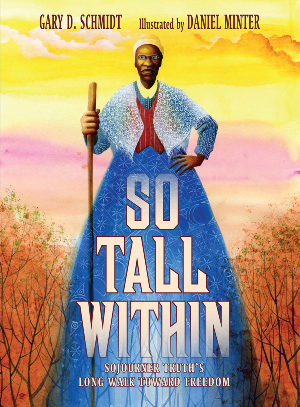How is it that a person becomes convinced of her inherent worth? How does a child sold for a hundred dollars along with a flock of sheep know that she’s worth more than the sheep, more than a hundred dollars?
The girl’s name was Isabella, and what the world told her, what people told her, was that she didn’t deserve to stay with her mother. She didn’t deserve shoes, not even in winter. She didn’t deserve rest. Her master boasted that Isabella could stay up all night washing the family’s laundry and be ready to work in the fields first thing in the morning. But, according to him, she didn’t have the right to choose her own husband or keep her own children.
Where did she learn to value her questions and opinions? When she raised her eyes to heaven and asked God, “Do you think this is right?” what gave her the boldness to voice her confusion? Who told her that she could take her baby in her arms and run toward freedom? Who gave a former slave the courage, when her five-year-old son was sold illegally to a new owner out of state, to travel many miles to Kingston, New York and present her case before the grand jury?
What conviction moves a woman to lay down her name and pick up a new one, to abandon “Isabella” and set out on a sojourn to tell the truth about slavery? Long before Rosa Parks refused to surrender her seat or her dignity, Sojourner Truth stood her ground before a streetcar conductor who refused to stop for her. When a man approached her after hearing her speak at a meeting and said, “I don’t care any more for your talk than I do for the bite of a flea,” Sojourner Truth replied, “Perhaps not, but, the Lord willing, I’ll keep you scratching.”
How could a woman so crushed under the weight of prolonged abuse and dehumanization feel “so tall within” herself that she would walk thousands of miles over fifteen years to tell her story, advocating, along the way, for former slaves, for women, for prisoners and those sentenced to death?
How did she know that she had a voice, and that she and her words had value?
I’ve often marveled at the constancy of character displayed by Sara Crewe in A Little Princess. I’ve wondered if it were possible for one so young to lose all her comforts and joys and yet remain unchanged. But Sara Crewe’s early childhood was marked by wealth, ease, freedom, and the love of a doting father. Little Isabella had no such advantages.
She did, for a time, have a mother who loved her fiercely, who assured her that the same moon and stars shone down on all their scattered family. And she did, I believe, have an understanding of the truth. Maybe a person becomes convinced of her worth, ultimately, because she is worthy. Precious. Irreplaceable. That such a truth could take root in the unforgiving world in which Sojourner Truth grew from child to woman, from woman to mother, and from mother to reformer, is nothing short of a miracle.

You can read more about Sojourner Truth in So Tall Within, by Gary D. Schmidt, Illustrations by Daniel Minter.
- The School of Wonder - September 18, 2023
- Celebrations - December 6, 2021
- The Junkyard Wonders - October 6, 2021

This sounds wonderful. Thank you.
I’m instantly reminded of George MacDonald’s Sir Gibbie. How do we learn the good and the right when no one is there to teach us?